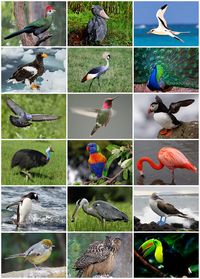
Photo from wikipedia
The objective of this work was to evaluate the effect of thermal challenge at different intensities and durations on the production responses of 3 to 21-day-old broiler chickens. Two hundred… Click to show full abstract
The objective of this work was to evaluate the effect of thermal challenge at different intensities and durations on the production responses of 3 to 21-day-old broiler chickens. Two hundred and ten Cobb chicks were subjected to dry-bulb temperatures (tdb) of 27, 30, 33, or 36°C for the duration of 0, 1, 2, 3, or 4 days from the second day of life onwards. The experiment was carried out in four identical environmentally-controlled wind tunnels. Data on body mass (BM), feed intake (FI), and water intake (WI), all in grams, were monitored daily; and body weight gain (BWG), in grams, and feed conversion (FC) were also calculated. The effect of duration was not statistically significant. Empirical models were adjusted to relate BM, FI, and WI with tdb and bird age. The performance of chicks at 21 days of age was analyzed using the BM, FI, WI, BWG, and FC values. Overall, the development of chicks at 33 and 36°C was better than that of those subjected to the lower tdb of 30 and 27°C. The exposure of chicks to cold thermal challenge in early life can have a carry-over negative effect on their production performance up to 21 days of age.
Journal Title: Pesquisa Agropecuaria Brasileira
Year Published: 2017
Link to full text (if available)
Share on Social Media: Sign Up to like & get
recommendations!